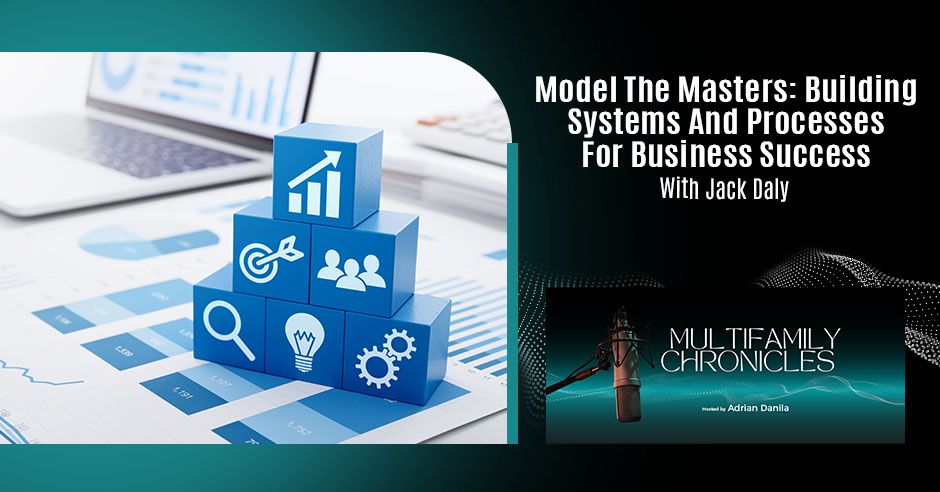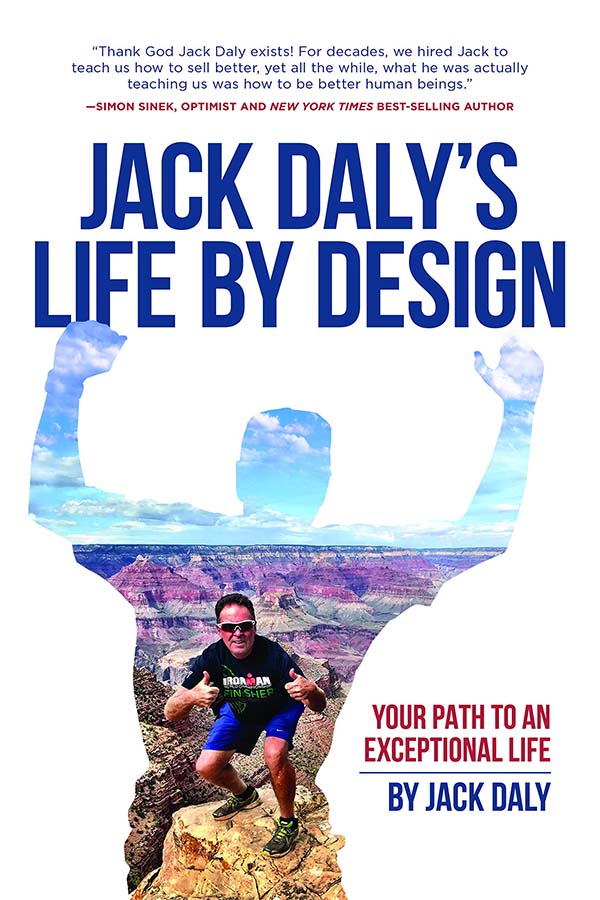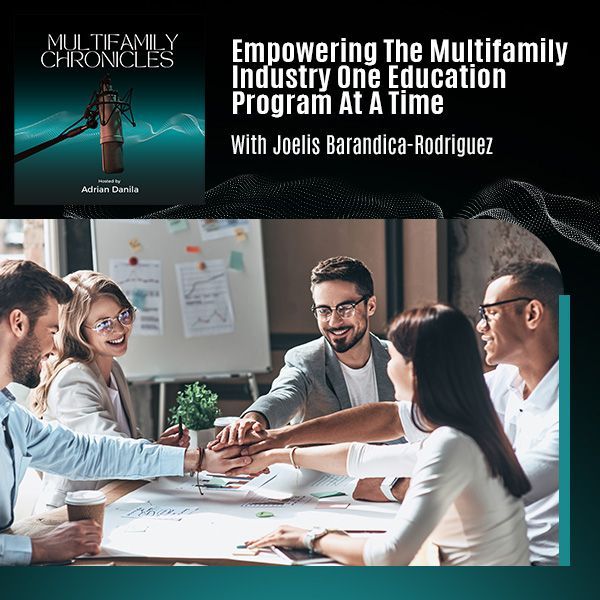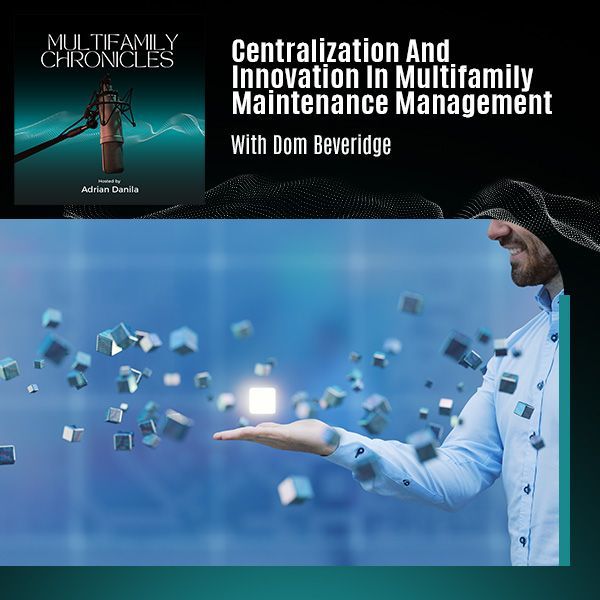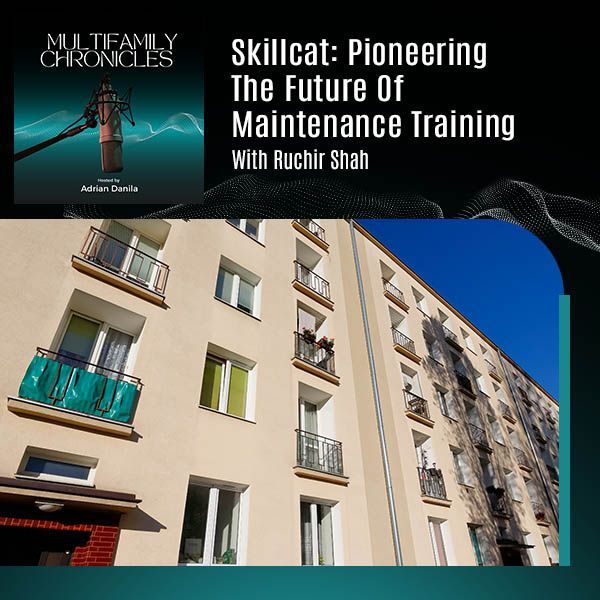Model The Masters: Building Systems And Processes For Business Success With Jack Daly
Some of the top businesses have figured out that to be successful, all you need is to follow those who were on the same path as you and have succeeded themselves. This is what Jack Daly calls “model the masters.” A leading sales speaker and trainer with over 30 years of sales and executive experience, Jack has seen some of the greatest teams and companies succeed by simply building the systems and processes based on those at the top. In this episode, he shares with us the key lessons he learned across his sales career from his books, Life by Design and Hyper Sales Growth. He dives deep into recruiting, building a winning culture, creating a bucket list and more. At the heart of Jack’s wisdom is the importance of creating systems and processes, which almost 98% of companies don’t have. Take advantage of this information as you tune in to this conversation today!
---
Watch the episode here
Listen to the podcast here
Model The Masters: Building Systems And Processes For Business Success With Jack Daly
In this episode, I have a very special guest and this is the guest that I've been chasing for months. He finally agreed to come on a show. Welcome to the show, Jack Daly.
Adrian, it's a joy to be with you. I love your energy.
Jack, you've been a leading sales speaker and trainer with over 30 years of sales and executive experience. You wrote ten books. I want to start by asking you about your last book first. Most people live life by default. Some people make a choice and live life by design. The title of your book is Life by Design. Why did you choose that title and why not Life by Default?
Adrian, that is a big can of worms that we open up with that great question. Here's the bottom line. I was very blessed. At thirteen years old, I took the summer and interviewed successful people. I wanted to know how they became successful. One of the biggest takeaways that I got was that you've got to have goals. They have to be in writing. Don't pick too many. Share them with other people and put some date on when you're going to get them done.
An awful lot of people do this type of process in their business life but they miss doing it in their personal life. I took a crack at that and planned my life out. From 13 years old to 30 when I was thinking that was pretty old, where I'm going to be financially, professionally, with family and education? If I could paint a picture of what I wanted to look like at 30, all I needed to know was what do I need to do between 13 and 30 in those 4 areas? I designed my life from 13 to 30 at 13 years old. I can tell you that I've been doing this for many years, living life intentionally.
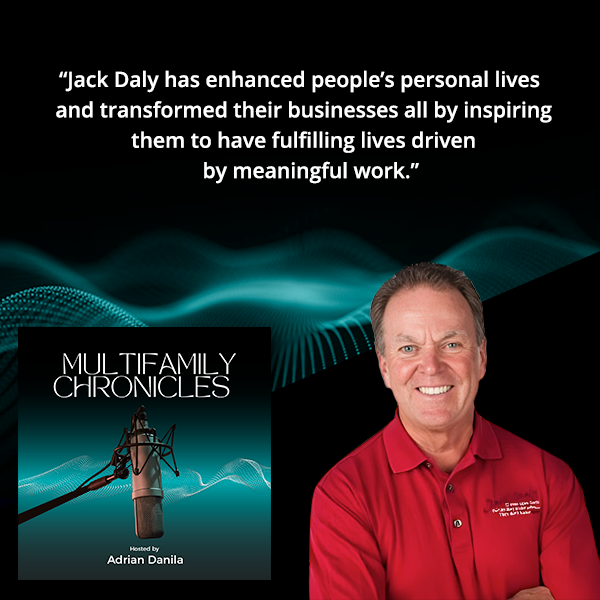
That's such an inspiring story, Jack. As I said in the introduction, I've been trying to get you on a show but I've been following you for several years. One of your books that I read is Hyper Sales Growth. That's a book that opened my mind in so many ways. I'm not a salesperson by trade but the way you describe recruiting is a way where people understand that we need to use a salesperson mentality when we do recruiting. That inspires me and that’s what I'm passionate about. I do training on recruiting. Would you like to elaborate on that a bit? How would a salesperson’s mentality in recruiting help them become successful in recruiting?
I'm all about two words that we don't often find in the sales side of the world which are systems and processes. My largest sales force was 2,600 salespeople. We were operating out of over 100 locations in the US. On every visit I made, I would give a similar speech, which was, “There aren't 2,600 best ways to sell this product. Let's figure out the best practices, build the systems and processes and practice the systems and processes. I bet you we do well against our competitors.”

If we take that same philosophy and apply it to recruiting, all I hear in the marketplace is how difficult it is to find good people. When I ask, “What process are you following for recruiting?” I get a blank stare. For example, “Do you have a list of people that you're recruiting? Do you have a profile of the attributes that makes a good candidate?”
I'm not talking about a job description but a profile of the attributes of what makes a good person. “Do you have a touch system where you're regularly courting those people?” The best people out there are often happy where they're at and they're not looking for a job but they do leave when something that I call life happens to them.
Their company is sold, they had a compensation change or the industry fell flat. We want to be ready. I say from a selling standpoint that if you're in the sales world, you've got a prospect list and you work the prospect list. In the recruiting world, you should have a prospect list and work the recruiting list.
One other thing that I read in your book and it stuck with me was, “Recruiting is not an event. It's a process. We should always be recruiting.” Could you elaborate on that?
I don't subscribe to something that I hear often out there, which is I'm fully staffed. You're never fully staffed. You always have room for a top producer. One of the things that I'm known for is this expression, “Sports teams are run better than most businesses.” If we take that concept of sports teams being run better than most businesses, ask any sports coach in any sport at any level if they have a recruiting list. They would tell you absolutely but they're fully staffed. I'm always looking for somebody terrific. When you go peel it back and look at sports and the sports teams that are most successful, what's behind that is they're always looking for an upgrade in talent. You always have room for top producers.
I use this idea of yours and what I propose to my industry is multifamily. That's what I'm gravitating to. I said, “Companies should build scouting departments.” I used the parallel that you made comparing the sports teams and why are they successful compared with other businesses. I said, “Create scouting departments and have individuals designated to chase down talent. That's all they do day in and day out.” Do you think that there's some value in that concept?
Yes. I'm going to go back to the sports analogy. We had a legendary college basketball coach retire in 2022. That was Coach K at Duke. He'd been at Duke for over 40 years. During that 40-year career, they were in the championship games often year after year. The team only has 15 players and those 15 players at Duke were all high school Americans so they're all very talented players. If you were to ask Coach K if he had a list of people his recruiting, he would say absolutely. If you asked him how many were on his list, he would say hundreds.
He had several people full-time on his payroll recruiting and scouring the world for great basketball talent. Part of the success of Duke was they're always looking for talented people and he set up that scouting team to go out and find it. Why not do the same thing? I'll show you something else that I find of interest when I ask my audiences to put a list together of fifteen top candidates and begin recruiting them. There are groans in the audience like, “Fifteen is a long list.” Yet, the sports teams are having hundreds. They're run better than most businesses.
Businesses, generally speaking, don't see that this is a successful model. This is how the top teams are staying on top and all they need to do is to copy.
That's true in so many disciplines of business and life. It's a concept that I call the Model the Master. If you want to do anything well, find people that are already doing it well and find out what they're doing. Let me show it to you this way. In a lot of companies, they have things called the President's Club or the Chairman's Club where they honor the top salespeople but what we often find is that the same people year after year, make it into the club.
I have a client in Western Pennsylvania and they do business all over the nation. They have over 400 salespeople but only about 25 to 30 make the Chairman's Club each year but 11 of them made it every single year. They have the same economy, the same competitors of the same product, the same price and the same service but eleven people consecutively year after year are making Chairman's Club. Find out what those eleven people are doing, build the processes based on that and practice them. Everybody's game is elevated.
Another thing that I'm noticing from my work experience is that businesses tend to spend most of their energy on the sites and locations where most of the problems are. When you do this, you go from offense to defense, from proactive to reactive and you drain most of your valuable resources into working on fixing problems versus looking at your top talent and top producers saying, “What are they doing right?”
Make a list, take that list and implement it to the other sites they're not doing as well. It's a symptom of property management. We're seeing this all over the place. We always tend to be in defense putting out fires. We never going to get ahead unless we create a system where we are going to have the best producers write a book and then implement it elsewhere.
You nailed it but I'm going to go a bit further. Where does the leadership of the company tend to spend the most time? Let's take the people that we have and put them in the quartiles. We have the top quartile, the 2nd quartile, the 3rd quartile and the 4th quartile. For example, a sales manager spends their time on the fourth quartile because they see the first guys are doing well.
If you go back to the sports teams that run better than most businesses, sports teams have a 1st team, 2nd team and 3rd team. Where does the head coach spend their time? They spend it with the top team. We've got it. Ask backward. Don't spend your time in the negative areas or the poor-performing areas. Spend your time with your better people and you'll elevate all of the game throughout the organization.
Don't spend your time in the negative areas, the poor performing areas. Spend your time with your better people, and you'll elevate all the game throughout the organization.
I want to stick a bit to recruiting, which you could tell that I'm passionate about. Scaling companies from zero to 2,600 employees is fantastic. What are a few secrets and things that help you be successful at that level and build companies with 2,600 employees?
That will take us days to answer. Let me see if I can put it in a compressed way. The biggest thing that I can tell you is that you've got to build a winning culture. Peter Drucker said it better than anyone, “Culture eats strategy for breakfast.” I take it back to Coach K at Duke on the basketball team. Every high school basketball player wanted to be courted by Duke because they had built a culture of excellence and winners.
People want to be attracted and go to those places where they are nurturing the winners. What are you doing to build a winning culture? There are four legs to a strong culture. 1) Recognition system, recognizing and rewarding people. 2) Communication systems, letting people know where we're headed and how we're doing.
3) Personal and professional development processes, showing people that if they come to work here, they’re going to grow personally and professionally so they’ll leave here better than when they arrived. 4) Empowerment process, which is giving authority to people to make decisions without going through the chain of command. If we can create those 4 legs to a strong culture, then you've got a place where 2,600 people will self-actualize. You won't have to tell them what to do. They'll go and do it on their own. You unleash this incredible energy.
On top of all of that, what we've been talking about earlier is critical and those are stems and processes. In sales, I call it having a sales playbook. The sad note is that our research tells us less than 2% of companies have documented sales systems and processes. Ninety-eight percent of companies are running around without a playbook. It is insanity. That would be cutting my 2,600 salespeople loose and saying, “Make it up out there and do it your way.” It's crazy.

This brings me to a picture that I'm seeing often on the internet. There's a desk phone and a sticky note on it with tape. It says, “Pick me up. I'll make you money.” It's so simple and amazing. It’s one of the first rules in a book. If you have the phone in front of you, you got to answer the phone. If you want to make a cell, you got to answer the phone. You're right. We're seeing scatter training here and there but it's not consistent. We have to have a book. Without a book or a rule set in place, things could go all over the place. We're not ending anywhere. There's going to be a lack of consistency in results.
If I can put that into some context here, Adrian, what we tell our salespeople throughout the world is this. “The key to sales success is to stay focused on what we call High-Payoff Activities or HPAs.” More than 50% of a typical salesperson's time is spent on things that don't win new customers or grow the ones you have. If you can get out of doing those non-HPAs and stay focused on the HPAs, being proactive, not reactive, then you're going to generate a lot more business.
If we go back to the early stage of this broadcast and you said you've been trying for quite some time to get ahold of me, the reason that it's difficult is that my schedule is packed every day for months out with HPAs. For you to get into the schedule is very difficult. That is proactive. Reactive is where the salesperson is waiting for a call and then pick up the phone or they're waiting for someone to walk into the store. I don't have a wait in me. All I know is how to get up in the morning and start attacking my HPA list.
I want to make two points about high-payoff activities. I'm a big believer in, “Play to your strengths, not your weaknesses.” Don't try to get your weaknesses to become average. Focus on the top 3 or 5 things that you do the best. That's going to give you an ROI way higher than trying to improve your weaknesses. There's another thing that I picked up from your books, conversations and interviews. When you do admin work, do I need to do what I'm great at and also become the admin or should I pay someone $12, $15 or $16 an hour and let them do the admin work and me focusing on this? Would you elaborate on these two aspects?
As a speaker, I can't avoid doing one-liners. Here's the one-liner on that. If you don't have an assistant, you are one. Some things need to be done in life but are not necessarily done by you. You have to pick the ones where you're the strongest and the ones that will be the most lucrative. We call that word leverage. “How do I generate more business with less work?”
If you don't have an assistant, you are one.
If I go back to when I was 12 and 13 years old, I built a newspaper route of 32 customers into 275 in a year but delivering 275 papers was an awful job. I was going to school during the day and I'm in the dark delivering 275 papers. I had no time to sell anymore, which is what my talent was. I hired five kids and paid them half the money the company paid me to deliver the papers so I could then sell more papers. Those were my five assistants. As a professional speaker, what I can tell you is I don't do a lot of the things that the other speakers do.
For example, in a typical year without a pandemic, I average about 250,000 air miles a year. I would be terrible sitting in front of a computer booking my travel but the majority of my speaker competitors are booking their travels. I do a workbook for all my presentations but my skillset to sit in front of a keyboard is not there. I have assistance that does those things for me. If you don't have one, you are one.
There’s so much wisdom in here. I got to keep going because I have so many questions. One of the things that inspire me about you is that you are a marathon runner. You competed in fifteen full Ironmans.
Yes, I have fifteen under my belt.
I also understand that you started it fairly later in life. You haven't been doing this in your 20s or 30s. Could you tell the audience how old were you when you first started? What got you motivated to start and also to get where you are because those numbers are impressive?
There's hope for all of us. Even though I've had an incredible life journey to date, if you were to ask me are my best years are ahead of me or behind me, I would tell you my best years are ahead of me. I have some big plans going forward. Let's go in the rearview mirror and take a look. At 37 years old, I did not run at all. One of my employees said there was a 5K starting and ending at my building for the heart fund. It would be great as the CEO if I signed up because other people would follow me.
I did that and got into doing 5Ks in 3.1 miles. I couldn't find one in one weekend so I signed up for a 10K and I liked that better than the 5k. I'm running 10Ks as a little over 6 miles. I said, “I might as well try a half marathon.” I did a half marathon in 13.1 miles. I remember sitting at dinner with my wife and we were celebrating. I had my medal and a glass of wine. She was taking a photo. I started laughing uncontrollably and she said, “What are you laughing at?” I said, “I've never celebrated doing half of anything in my life.” She goes, “Are you serious? You're going to do a full marathon?” I said, “Yes.”
At 46 years old, I did my first marathon. As of 2022, I've done 100 marathons, 1 in all 50 states and 1 in all 7 continents. I finished my 100th in Athens, Greece. There's no age limit when you can get started and there's no age limit when you stop. That's the marathon story. Here's the Ironman story and this one's even better. I had on my list when I was about my 40s to do an Ironman but that requires a lot of training for probably 25 or 30 hours a week. I was running a company and I had my young kids at home. I didn't feel like I had the time to properly train.
When I sold my companies and I had no employees and my kids grew up and they weren't even needing me as much as they needed, I said, “I'm going to do that.” I was 58 years old. The killer of this is I didn't know how to swim. There's a 2.4-mile start to the Ironman on the clock with a swim, then a 112-mile bike and a 26.2-mile run. I hired a coach to teach me how to swim. I practiced a lot of swimming and then I signed up. At 58, I did my first one. In the next 8 years, between 58 and 66, I had 15 full Ironmans, including the Ironman World Championship in Hawaii and I did 60 half Ironmans.
I have no words. This is such a remarkable thing to say from someone at your age that your best years are ahead of you. This is so important. I do want to circle back and go to something that you have in your latest book where you're talking about your bucket list which characterizes your “crazy ambitions.” When did your bucket list start? How has it evolved? How does that help you keep on track? How does that bring meaning to what you do in life in general?
I was in my 20s and I'm starting to get my eyes open to the world. I would see people doing certain things that sounded exciting. I said, “I'm not ready to do that now. I don't have the money and time to do that now. I'm going to start making a list.” I called it a life list and I start memorializing all the things that I was going to do before I was too old to get them done. Once I started this life list, it made me more alert to conversations I'm having with people and they would say they did this or that. I'm like, “That's great.”
They traveled here and there. Travel was appealing to me. I'd never been to Paris or London. At some stage in my life, I had never been to Las Vegas so I started putting all these things down on my life list, “Here's what I'm going to go do.” It got bigger and bigger. If you went to one of my websites JackDalysLifebyDesign.com or JackDalySales.com, my bucket list is printed on there for all the world to see. There are some tremendous things that I've done. I went to South Africa and I'm in the water with the great white sharks.
Also, the world’s largest bungee jump in New Zealand. I flew a jet fighter plane with no flying instructions. There's crazy stuff that I've done. I have some significant things on the list that are still ahead of me and are going to be fun to do. I changed it to a bucket list when the movie came out because I thought that was cute.
It's also catchy. People could have a point of reference knowing the movie so it is easier to relate to that type of list. I want to stick to your latest book and I have one more question about something you're addressing in your book. You're walking your readers through what you call a year in life. What is that about?
Before I answer that, here's the book. Jack Daly's Life by Design. The picture is me standing in front of the Grand Canyon and that's because I've done something called the Rim to Rim, which is running from one side of the Grand Canyon down to the bottom, across the base, back up and turning around and doing it again. It's about 25 miles each way. It's 50 miles in total. It's about 650 flights of climbing the equivalency. It's not for the meek. Let's go back to a year in the life of Jack Daly.
I usually do it every five years like when I was 50, 55, 60, 65 and 70. The next time I'll do it is 75. You could do it every year if you want it but what I decide to do is every five years, I'm going to take at least one photo every single day. I'm going to take my photos for the year and put them together into a coffee table photo book that's called A Year in the Life of Jack Daly.
What I wanted is to up my game. In other words, I wanted to have a book of photos that people would page through and say, “You've done more in one year than most people do in their entire life.” The cool thing about this is that you know when those years are going to happen when you're going to be 70 or 75.
I save up some things and do them that year so that the book can be even more spectacular because I've already planned to make life even better. I can tell you when I did it when I turned 70, that book ended up being 4 books. We had to do them by quarter because the photo books were at least 100 pages each. It was like, “Are you kidding me?” There are a couple of different safaris and all the other crazy zany things that I did during those times.
You go to bed each night and in your mind, you’re going, “Based on my calendar tomorrow, this will be my photo.” When you wake up, you go, “Let's keep an eye out. Maybe we could find some other activity that goes on that's even better.” You're on the search for how you can have a better life. What you don't want to have is a photo book where there are 300 pages of you sitting behind your computer at your desk. That would be a terrible life.
People say they want to be more successful. The hands go up in my audience but you can't define success. You can't get there if you don't know what it is. The cool thing about the bucket list is I publicize it. Many people look at it and go, “Have you got that one done? I can help you do that.” If we don't know what we want to do personally and we don't share it with the universe, the universe can't help us get what we want to be done. That's Life by Design.
Jack, if you were to turn back time and be twenty years old again, what would you do differently with your life?
There's not a lot that I would give to that answer because I have been so intentional about my life. If I look in that rearview mirror at that twenty-year-old and said, “What are the things that we could do that would accelerate and enhance your life beyond the one that you've already had,” the thing I would tell you is don't be hesitant to try new things and take risks. The worst thing that can happen is it didn't work. You do something else but if you don't try things, you'll never know whether it was feasible or not feasible.
Don't be hesitant to try new things and take risks because the worst thing that can happen is it doesn't work, and you do something else.
I went to school as an accountant. I graduated with an Accounting degree. If you take your prototype of what an accountant looks like and look at where I've been for the last 25 years as a professional speaker on stage with all of the people that are on Shark Tank, with Richard Branson and all of these different people that you go, “That guy's a celebrity,” you don't think of it as a guy that's an accountant. This accountant took the courage to take a rest and left the world that he was comfortable in to put himself into a world that was not comfortable.
I'll give you this part and I've never shared this on any program. I was a very successful business leader making seven figures annually with lots of stock and so forth. I had my chef and driver on a jet-on-call at Burbank Airport. Also, a helicopter was on the roof of my office. It was a pretty nice gig but I left that world to become a professional speaker. I called myself in the first couple of years a starving speaker.
In my 1st year, I made less than $70,000 a year. I left all of those nice trinkets and that comfortable income to go into a world that was new to me. What I said to myself was, “This is what I want to do. I'd like to give it a great shot. If I don't succeed, I can always go back to the other world. If I don't take a risk, I'll never know and it'll always haunt me. What could I have done and how could I have been more impactful in my life?” My impactful life is so much enhanced by what I've been doing for the last several years, compared to the earlier 30 years as a business leader and owner.
Do something meaningful to you. Not to say that what you did before was not meaningful but bring more meaning into your life than what you had. Increase that percentage of meaning in what you do. It’s phenomenal. I would love for people to watch at least this part to understand that you could have such a fulfilling life if you're driven by meaningful work.
Adrian, I will share this with you. It is so gratifying and humbling to get snail mail, emails and text messages from people all over the world telling me how I impacted them in some way. I can tell you about these business success stories of clients who have gone from a relatively small business to a very large business successfully. I could do that.
I could tell you about people that were making $50,000, $60,000 and $70,000 a year that are making 6 figures and some of them 7 figures annually as a result of things that they learned as a result of working with me. I have several of them in Life by Design. The best stories are about people whose personal lives were enhanced.
There's a story of Michael in my book where he was over 400 pounds in his late 20s. He knew that he was going to live a short life if he didn't get his act straightened out. He came to me and asked me to do a triathlon with him. I eventually did. In 2022, he has done marathons and Ironmans and weighs about 200 pounds.
He said, “You magically changed my life.” His parents tell me that I saved his life. That's going too far but these are the things that give me the energy to get up every morning and want to make a difference. I don't know where my next Michael is but there's a next Michael out there and I'm going to be there for them.
That's such an amazing story and super inspiring. We can't help everybody all the time but if we could make a difference in one person's life, our life is different. It brings meaning like nothing else being able to see that one single person that you were able to help turn their life for the better following what you said, done and your advice.
In part, this is the reason why I try to bring people like you on the show. I try to get the word out there for many lonely people. They don't know whom to turn to for advice. If they could take 20, 30, 40 or 50 minutes of their time to watch a video and get so much wisdom that you're sharing with the audience, it could change their life.
The ROI here is amazing. That's one of the reasons that drive me to do these shows so I could share with the world successful and inspiring stories like yours with the hope that we could multiply. It's not just whom you're impacting in person but this could go to hundreds or thousands of people who could say, “I could be that person.”
Let me show you another way that any person who's reading could impact the world. I'm very active on social media. I'm going to use Facebook as an example. On a sad note, my wife of 47 years, her name was Bonnie, passed away in 2017 from pancreatic cancer. I'm remarried to a long-term client and her name is Karen. When Karen got together with me, she had been a client of mine for twenty-some years but didn't know me in a personal way as she does now.
When we got together and moved in, she started to see people making comments to me in a variety of different ways that said, “You have inspired me to get off and go exercise.” Every day, I exercise and I do quite a bit of it. I post on Facebook what my exercise for the day was. People say, “Every day, there you are doing these rowing, riding a bike, running, swimming and all the things you're doing. You give me the guilt. If this guy can find time to do it, I'm going to get up and do it.”
Previous to that, Karen didn't know what the backdrop was so she wondered, “Why is Jack always posting all of this stuff about his exercising?” What she didn't realize is I'm posting it to encourage people to go take better care of themselves physically. If I only touch and impact one person, isn't it worth it? No matter who you are, if you can demonstrate that you are elevating your game of life, you're going to positively impact others.
If you can demonstrate that you're elevating your game of life, you're going to positively impact others.
In all honesty, Jack, I would love to do a second episode. I know that due to your schedule and everything, we can't go for too long. I would love to go for way longer than we did because I can't get enough of this conversation.
Here's the thing, Adrian. We should have a second session but people won't stay with you if you go much longer than where we've been so far.
That's also a possibility because people tend to say, “If I could read this on my way to work, I'm on a hit play. If it's going to be a two-hour-long video, maybe not. I don't have the time.” They get discouraged by the format. In closing for the first episode with Jack Daly, Jack, is there something that I didn't ask or cover that you wish we would've talked about?
How about this? If my best years are ahead of me, what's some evidence of that? I'm in all likelihood going to refocus my energy on kids as opposed to adults and show them how to have an incredible life. I'd love to get ahold of teenagers and take them through Life by Design. That's one of the things that I have going on in my future. Another thing is what are some things on my bucket list that I haven't checked off that is pretty heady stuff?
One of them is to meet the president of the United States in the Oval Office. Another is to take a ride on Air Force One with the president, run with the bulls in Pamplona, carry the torch during the Olympics and play golf at Augusta where the masters have played. There are about five bucket list items that if anybody's reading and you can make one of those happen, I'd love to have that happen.
One of the other things that I'm playing with is I finished my tenth book but I'm thinking that I may do a series of children's books like a cat and a hat type of thing, which has all of the aspects of Jack's going to fail. It's a lot of risks. That's where I like to place myself to see if I can take my game to another level.
I love to have you back, Jack. I have a much longer list of questions, some of them which I had prepared for the next episode and some of them came from the conversation with you but due to time constraints, I couldn't do it. Hopefully, we could do another episode down the road.
We will make it happen. We need to find that time in the calendar but we will do that.
Jack Daly was a real pleasure. I couldn't get enough of this conversation. Thank you very much. You've been very generous with your time and wisdom. You are inspiring a lot of people out there. Keep it up.
I appreciate you doing the show and pushing it out into the universe. Thank you, Adrian.
Thank you, Jack.
Stay healthy.
Everybody, thank you very much for reading. I hope to see you back here for another episode. Have a great time.


